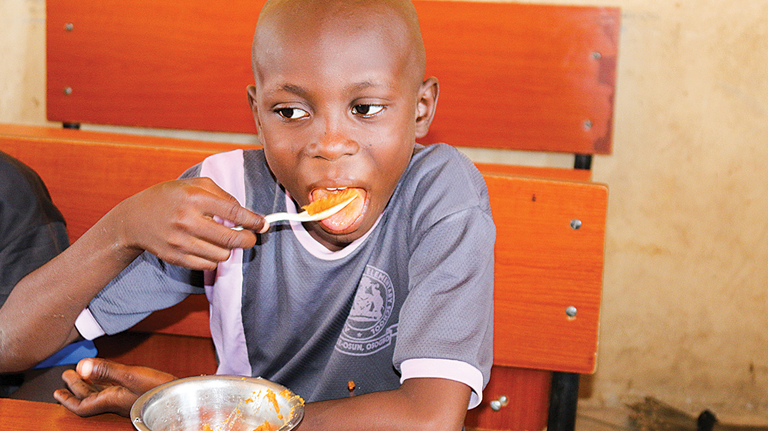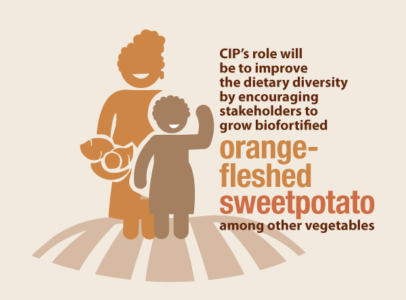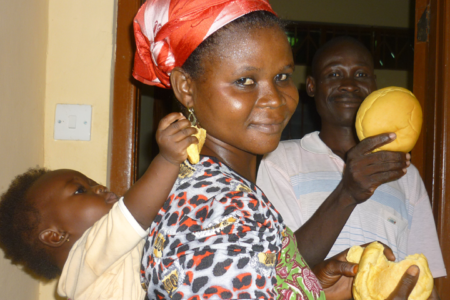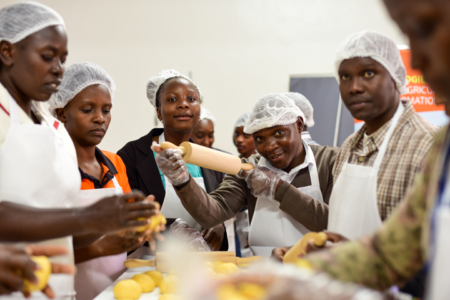
Nutrition-sensitive kitchen garden intervention.
In the latest phase of this project, the International Potato Center (CIP) works with a range of stakeholders to improve dietary diversity and fight malnutrition by introducing biofortified orange-fleshed sweetpotato and other selected vegetables (pro Vitamin A maize, grand nuts, and moringa) as key ingredients in the diets of families with young children.
Background
The ‘Working to improve nutrition in northern Nigeria’ (WINNN) project has been active since 2011. Funded by the UK Department for International Development, WINNN is led by Save the Children, Action Against Hunger, and the UN children’s fund, UNICEF. By 2019, the program had reached 10 million children with life-saving vitamin A, 26 million doses of deworming tablets, and 1.4 million with diarrhea treatments. As well, 10 million women received iron folate supplements.
Despite these achievements, the interventions have not yet reached full scale at the state level. To address these constraints, phase II focuses on transformational activities to deepen state and federal level buy-in, ownership, and investment in the scalable models to ensure the sustainability of the interventions delivered in the previous seven years.
The International Potato Center (CIP) plays an important role in the latest phase of the project (2019–2020), helping secure broad recognition and acceptance of the need for adequate nutrition among key policy- and decision making institutions. CIP seeks to promote government commitment for nutrition interventions over the long term and works to build on the success of the earlier nutritionspecific phase by placing increased emphasis on scaling up
a livelihood and food security component.
CIP’s role will be to improve the dietary diversity of key beneficiaries in Yobe and Jigawa states by encouraging stakeholders to grow biofortified orange-fleshed sweetpotato (OFSP) among other vegetables in their kitchen gardens. OFSP is rich in vitamin A and has proven to be an effective tool in combatting micronutrient deficiency. It is of particular benefit to young children because vitamin A is essential for healthy growth.
CIP will also help to build the capacity of government and private sector actors, as well as farmer associations and research institutions, to disseminate quality planting materials and knowledge on how to manage the crop for maximum productivity.
Objectives
For the current phase, CIP aims to improve access to nutritious and affordable diets, and document and share the lessons learned for future programs and for replication by government by fulfilling three objectives:
- To increase adoption and diffusion among WINNN beneficiaries of orange-fleshed sweetpotato in Jigawa and Yobe states;
- To empower WINNN beneficiaries on sweetpotato-related nutrition, processing and product development; and
- To generate awareness among beneficiary groups of the benefits of, and demand for, nutritious foods.

Approach
WINNN activities target mothers who are leaders of infant and young child feeding (IYCF) groups and women caregivers or mothers of clients who have recovered severe acute malnutrition (SAM) and who are already engaged in the national child feeding program in Yobe and Jigawa. The project team has established demonstration kitchen gardens planted with OFSP and other selected vegetables. The gardens are used to educate farmers, with senior extension workers also learning about relevant cultivation practices through ‘training of trainers’ courses. At the same time, capacity building activities are conducted with existing vine multipliers (farmers, farmer groups, and private sector) to increase the availability and quality of improved planting materials.
Meanwhile, the target beneficiaries are invited to join cooking demonstrations to learn how to process sweetpotato roots. The added-value products, which include puree and other foods suitable for infants, can be used within the household and sold to generate an income. Links with suitable markets are also being built, including with private sector companies and government nutrition interventions. These activities are supported by media campaigns to generate broader awareness among consumers of the benefits of eating OFSP. To lay the foundations for future scaling up, the team has conducted a full review of the demonstration phase, including a comprehensive gender analysis. This review will be used as the basis for an evidence and advocacy report.
Expected outcomes
CIP will demonstrate how OFSP can be produced and marketed for profit, and how additional benefits can be gained by a wide range of stakeholders when sweetpotato is included in feeding and nutrition programs. The target is for approximately 1,000 IYCF group members and 5,000 households to be growing OFSP and two additional nutritious vegetables in their kitchen gardens. Promoting orange-fleshed sweetpotato in strategic initiatives, such as the national child feeding program, is also expected to support groups of mothers and other care-givers to initiate more commercial farming activities and smallscale food processing businesses, creating opportunities for entrepreneurship and income generation, and cheaper prices for consumers.
Following this demonstration phase, CIP will continue to support wider training of agricultural extension workers and leaders of mothers’ groups. Ultimately, it is hoped that the government of Nigeria will fully incorporate the initiative into its national nutrition programs.
| Key outputs | Targets |
| Beneficiaries growing, eating and selling orange-ø eshed sweetpotato | 2,500 |
| Demonstration gardens established | 36 |
| Vine multipliers trained on commercial quality production using improved technologies | 18 |
| No. of nutritious sweetpotato varieties available in the target communities | 2 |
| Indirect beneficiary households growing improved sweetpotato varieties and two selected vegetables | 5,000 |
| IYCF group members growing improved sweetpotato and two selected vegetables | 1,000 |
| % of IYCF support group and severe SAM clients trained on processing bioavailable nutritious foods (step down training) using recipe cards | 50% |
| Proportion of women of reproductive age and children under the age of two with increase intake of vitamin A rich food | 60% |
| Sweetpotato messages integrated into nutrition messages (through recipes cards, education and communication materials) to reach beneficiaries | 2500 |
| No. of sweetpotato food recipes incorporated into WINNN recipes | 5 |
| No. of mass media programs produced on OFSP and selected vegetables | 5 |
| No. of formal and informal markets identified | 4 |
Contact
Jude Njoku
CIP, Nigeria
j.njoku@cgiar.org
Thanks to our donors



